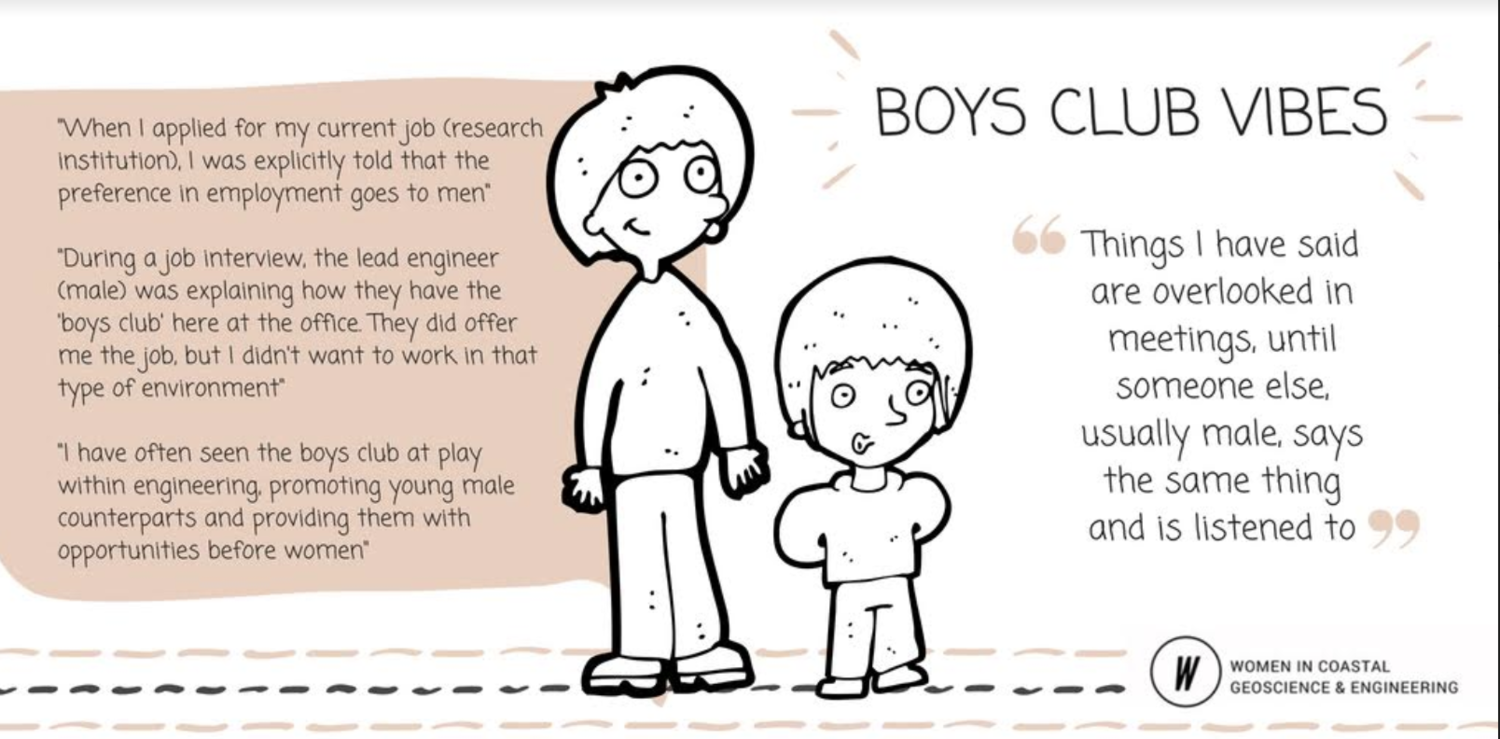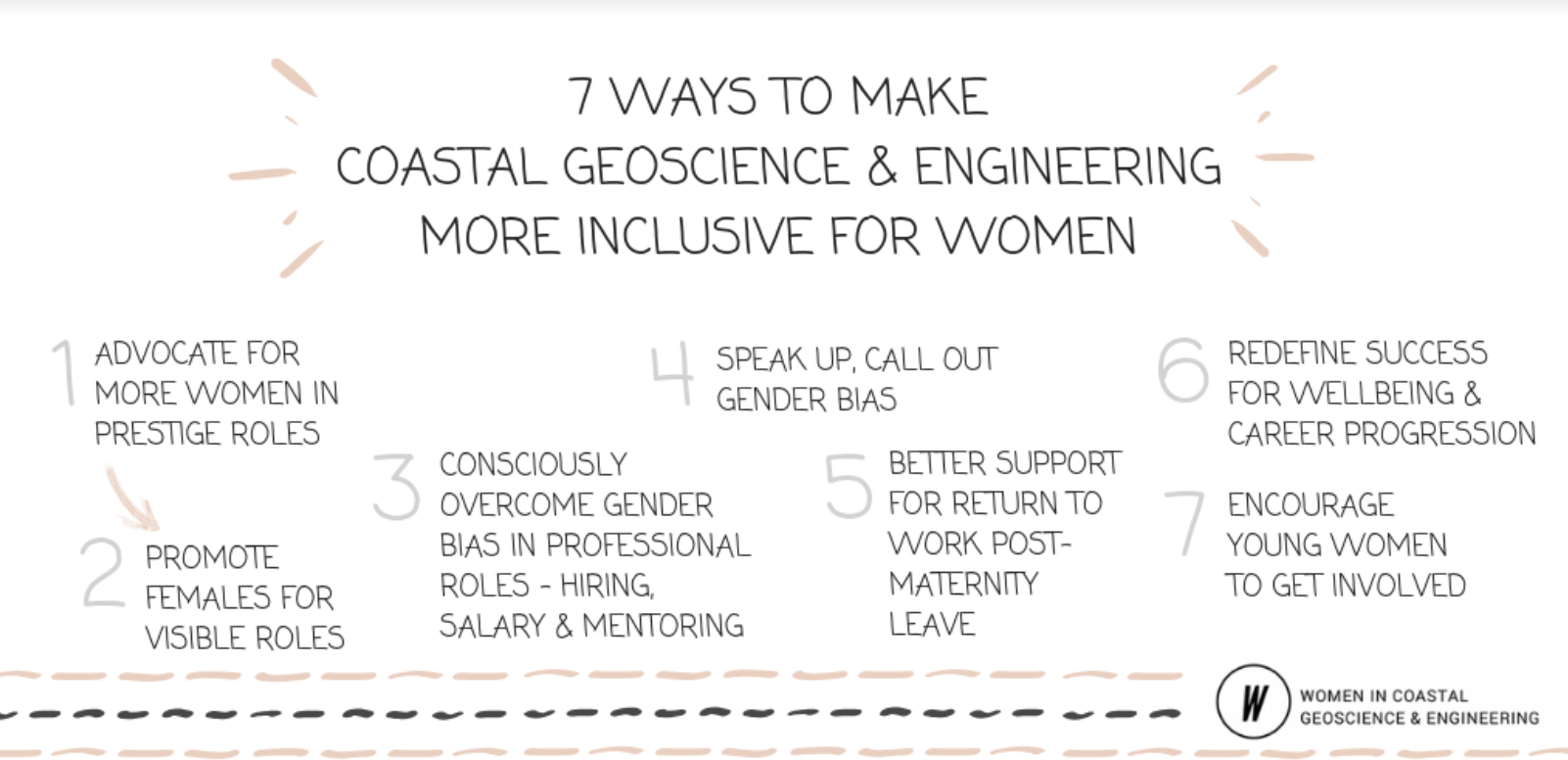WICGE is the international network for Women in Coastal Geoscience and Engineering. I am a committee member and we aim to achieve gender equality in Coastal Geoscience and Engineering. We are all scientists or engineers and, as such, we need to look at evidence and quantify problems before attempting to find solutions. This is what we set ourselves to do in 2016 when we launched a global survey to understand gender inequality in our field. Aside from the survey, we trailed the internet and spent endless hours counting the number of women that occupied prestige roles such as editors, committee members, conference chairs in the main journals, societies and conferences in our professional field.
We have recently published a paper with title, “Steps to improve gender diversity in coastal geoscience and engineering.” The paper has been really well received and we have been praised for presenting data-driven evidence and for providing constructive solutions.

The problem
We found clear evidence of gender inequality in Coastal Geoscience and Engineering. While women constitute about 30 percent of the professionals, prestige roles are mostly occupied by men. The path to the prestige roles is important. If there is a clear and transparent path in which candidates can self-nominate or be nominated by peers, women achieve the 30 percent representation. The traditional invitation-only path translates into men inviting mostly other men, and the consequent underrepresentation of women.

The causes for the problem
We classified the barriers stated by our respondents in five broad categories. Many of these barriers or problems were related to fieldwork were women were simultaneously stereotyped, harassed or set apart from the core group of men.
- Lack of role models. 82 percent of female and 79 percent of male respondents believe that there are not enough female role models in CGE.
- Gender stereotyping where women are not perceived as competent (or just incompetent), and are not taken seriously.
- Boys club refers to a general culture favouring men where women are not automatically granted the “buddy status.” As a consequence, women are not part of the group and are not invited to collaborate, to the field, or to a prestige role.
- Maternal wall. Motherhood is a double (or multiple) edge sword: In one hand there is a career interruption where the woman is away taking care of the baby; in the other hand, women who choose motherhood are seen as worse performers not interested in their careers.
- Micro-aggressions and harassment were also mentioned in the responses. The slow erosion caused by micro-aggressions is well-documented as one of the main barriers to diversity. Harassment was reported in situations such as fieldwork.

Seven steps towards achieving gender equality
So, having quantified the problem and analysed the causes, we set to propose solutions that could work. And we came up with seven steps. The first four steps can be implemented by everyone from now; steps five and six need institutional support; step seven implies a generational change. My personal opinion is that if enough people take ownership of the first four steps, institutions will feel pressured to address steps five and six, and the desired generational change will occur naturally.
- Advocate for more women in prestige roles. This is one way of creating role models and breaking the boys-club habit. We should collaborate with more women, invite more women to participating in high-end international projects and invite them or nominate them for prestige roles. Let’s advocate for fair gender ratios in leadership and for fair and transparent pathways to prestige roles.
- Promote high-achieving females. There are plenty of high-achieving females, we need to recognise and publicise their achievements. By doing this, we are supporting our senior women, those who have survived and thrived under non favourable conditions, so they are known and become role models.
- Awareness of gender bias. We all have biases and we should reflect on our personal biases when hiring, promoting, mentoring…. Consciously reflecting on our biases will help us reduce their effect.
- Speak up. All of us, independently of gender, should speak up when gender ratios are not fair. Ensure inclusion and equality in everyday work events, leadership positions, fieldwork and even morning coffee.
- Better support for return to work. We need institutional support for this; women need fair parental leave entitlements with no strings attached and support when returning from leave. This includes financial and mentoring support to stay in employment, and flexible working hours. Professional resumes should be assessed relative to opportunity.
- Redefine success. There is a huge diversity in contributions and working styles. Why should we be evaluated in the same way as 200 years ago? Working 15 hour days is not success, independently of salary or reputation!
- Encourage more women at a young age. If we address steps one to six young women will see a welcoming culture with diverse role models and opportunities for progressing in their careers. They will want to be part of it.
Finally, as we state in our article in The Conversation, “By choosing to ignore inequity for women, you become accountable for allowing it to continue. Speak up, promote the work of your female colleagues and give them voice and visibility.”
At WICGE we are already working on the steps, what are you waiting for?

Follow us on Facebook for all the latest news on how you can keep Thriving.
More from Thrive Global:
8 Things You Should Do After 8 P.M. If You Want to Be Happy and Successful


